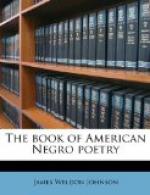[Footnote 1: Placido’s sonnet and two English versions will be found in the Appendix.]
In considering the Aframerican poets of the Latin languages I am impelled to think that, as up to this time the colored poets of greater universality have come out of the Latin-American countries rather than out of the United States, they will continue to do so for a good many years. The reason for this I hinted at in the first part of this preface. The colored poet in the United States labors within limitations which he cannot easily pass over. He is always on the defensive or the offensive. The pressure upon him to be propagandic is well nigh irresistible. These conditions are suffocating to breadth and to real art in poetry. In addition he labors under the handicap of finding culture not entirely colorless in the United States. On the other hand, the colored poet of Latin-America can voice the national spirit without any reservations. And he will be rewarded without any reservations, whether it be to place him among the great or declare him the greatest.
So I think it probable that the first world-acknowledged Aframerican poet will come out of Latin-America. Over against this probability, of course, is the great advantage possessed by the colored poet in the United States of writing in the world-conquering English language.
This preface has gone far beyond what I had in mind when I started. It was my intention to gather together the best verses I could find by Negro poets and present them with a bare word of introduction. It was not my plan to make this collection inclusive nor to make the book in any sense a book of criticism. I planned to present only verses by contemporary writers; but, perhaps, because this is the first collection of its kind, I realized the absence of a starting-point and was led to provide one and to fill in with historical data what I felt to be a gap.
It may be surprising to many to see how little of the poetry being written by Negro poets to-day is being written in Negro dialect. The newer Negro poets show a tendency to discard dialect; much of the subject-matter which went into the making of traditional dialect poetry, ’possums, watermelons, etc., they have discarded altogether, at least, as poetic material. This tendency will, no doubt, be regretted by the majority of white readers; and, indeed, it would be a distinct loss if the American Negro poets threw away this quaint and musical folk-speech as a medium of expression. And yet, after all, these poets are working through a problem not realized by the reader, and, perhaps, by many of these poets themselves not realized consciously. They are trying to break away from, not Negro dialect itself, but the limitations on Negro dialect imposed by the fixing effects of long convention.




